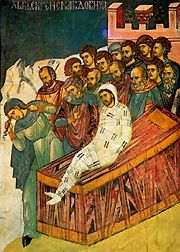Luke 7, 11-17
And it came to pass that on
the next day Jesus went into a city called Nain, and his disciples and a large
crowd went along with him. And as he drew near to the gate of the city, they
became aware that a dead man was being carried out—the only born son of his
mother, and she was a widow. And a large crowd of people from the city
accompanied her.
And seeing her the Lord felt her suffering, and
said to her, “Weep no more.”
And approaching, he touched the coffin, and
pallbearers stood still. He said, “Young man, I say to you, arise!”
The dead man sat up, and began to speak. And Jesus
gave him to his mother. Astonishment and awe seized all who were standing
there, and they began to praise God and to glorify what was here revealed,
saying,
“A prophet powerful in spirit has been raised among
us, and God has come down to us, his people.”
10th August Trinity
Luke 7: 11
-17
During the course of the year, some fruits drop early, while
they are still green. Others go on to ripen and mature.
The only place in the universe where a living being can
experience death is here on the earth. We carry this death inside us. As the
poet Rilke says:
We are only the rind and the leaf.
The great death that each of us
carries inside is the fruit.
Everything enfolds it.[1]
The angels in heaven cannot die. Christ had to come to earth
as a human being in order to be the only heavenly being to go through death, to
ripen it and harvest it. He went through death as a human so that humans could
live through death and rise.
In today’s reading, Christ encounters a young man, a sort of
green fruit, who had dropped early. This young man had died before really
finishing his life’s task. Christ appeared at the crucial moment and infuses
him with new life – “Young man, I say to you, arise!” He helps him maintain and complete what he
himself could not do out of his own forces. He helps him maintain and complete
his life. The young man was given another opportunity to mature and ripen. The
poet:
We are trees for yielding a sweet
death.
But, fearful, we wither before the
harvest.
Dying is strange and hard
If it is not our death, but a death
That takes us by storm, when we’ve
ripened none within us.[2]
We all carry death within us— like a fruit waiting to ripen.
Inside the fruit is the seed of ongoing life, eternal life. Eventually the old
useless husk of our egotism cracks and must be cast off. We must die to our own
selfishness. Paradoxical as it sounds, we are meant to ripen the fruit of
dying, so that we can live. And so the poet says:













